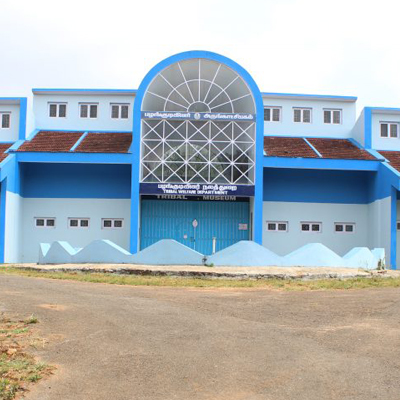Tribal Museum Ooty - Tamilnadu

Ooty, also referred to as Udhagamandalam, is a top hill station situated in Tamil Nadu, India. It is encircled by verdant forests, tea plantations, and undulating hills, making it a haven for those who appreciate nature and seek thrilling adventures. The town is also the birthplace of the Ooty Tribal Museum, an intriguing cultural hub that displays the way of life, traditions, and customs of the native tribes of the Nilgiri Hills. The Tribal Museum is located on the campus of the Tribal Research Centre in Muthorai Palada, a distance of about 10 kilometers from the central Ooty town. The primary objective behind the creation of the Tribal Museum in Ooty was to safeguard the cultural legacy of the tribes from Tamil Nadu and the Andaman and Nicobar Islands. Beyond highlighting the deep cultural roots of these tribes, the museum also explores the anthropological and archaeological facets of ancient human societies.
The Ooty Tribal Museum was established in 1960 by the Government of Tamil Nadu to preserve and promote the cultural heritage of the tribal communities of the Nilgiri Hills. The museum is located in the middle of the town, near the Ooty Botanical Gardens, and is managed by the Tamil Nadu Archaeology Department. The exhibits at the Ooty Tribal Museum include traditional weapons, hunting tools, musical instruments, jewelry, and clothing from the Toda, Kota, Kurumba, Paniya, and Irula tribes. These tribes are the original inhabitants of the Nilgiri Hills and have distinct cultures and languages. One of the best exhibits in Ooty Tribal Museum is the Toda embroidered cloth, called Pukhoor, which represents the tribe's identity and spiritual beliefs. The Kota tribe is known for their unique pottery made from clay, sand, and cow dung. The Kurumba tribe has a collection of medicinal plants and herbs used in their traditional medicine. The Paniya tribe displays hunting tools and weapons, while the Irula tribe showcases their techniques for catching and handling snakes. The museum also exhibits various musical instruments used by the tribes. The Ooty Tribal Museum is significant in preserving and promoting the cultural heritage of the indigenous tribes of the Nilgiri Hills, providing insight into their unique ways of life, and fostering awareness and understanding of their cultural identity.
The Tribal Research Center serves as a hub for studying tribal communities and preserving their heritage. Ooty Tribal Museum also has a library with a collection of books and journals on tribal studies, which enhances the educational and research aspects of the center. It is a valuable resource for those interested in learning more about tribal cultures and traditions in Tamil Nadu this museum also exhibits various items such as tribal model huts, temples, ornaments, weapons, utensils, basketry, pottery, agricultural implements, hunting and fishing materials, paintings, photography, sculptures, and medicinal and forest produce items. All the artifacts in the Ooty Tribal Museum are collected from 36 different tribal ethnic groups in Tamil Nadu, as well as from tribal communities in other parts of India and the Union Territory of the Andaman and Nicobar Islands. The museum enables a platform for tribes to showcase their skills, knowledge, and creativity and interact with visitors. The museum's gift shop sells handicrafts, textiles, and jewelry made by the tribes, providing them with an additional source of income. The Ooty Tribal Museum is a must-visit destination in Tamil Nadu for anyone interested in learning about the rich cultural heritage of the indigenous tribes of the Nilgiri Hills. The museum's exhibits offer valuable insights into the tribes' traditions, customs, and lifestyle, promoting cultural understanding, tolerance, and appreciation. By supporting the museum, visitors can contribute to the preservation and promotion of these unique and fascinating cultures.
How to Reach Tribal Museum Ooty
By Air: Coimbatore International Airport, about 96.5 Km away from the museum.
By Rail: Coimbatore Junction Railway Station, 88 Km away. From the railway station, you can avail of public transport or get a cab/ taxi to reach the museum.
By Road: Ooty is well-connected by road to nearby cities and states. You can use private vehicles, public transport, hire taxis or an auto-rickshaw to reach the museum.
Visiting time Tribal Museum Ooty
10 AM to 1 PM & 2 PM to 5 PM. Closed on Fridays, second Saturdays and National Public Holidays.
Entrance Fee Tribal Museum Ooty
Free.